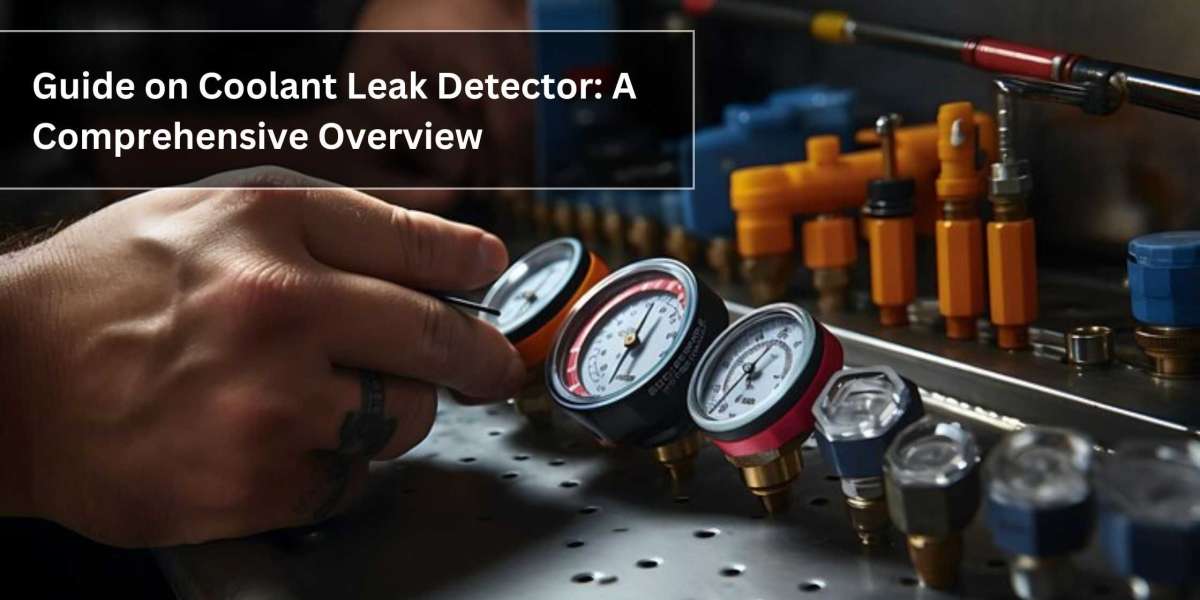In the realm of industrial machinery and automotive engines, maintaining optimal performance is paramount. One crucial aspect of this maintenance is monitoring for coolant leaks. A coolant leak detector is a vital tool in this endeavor, enabling early detection of leaks before they escalate into costly problems. In this comprehensive guide, we delve into the functionality, types, benefits, and FAQs surrounding coolant leak detectors.
Understanding Coolant Leak Detectors
A coolant leak detector is a specialized device designed to identify leaks in coolant systems promptly. These systems are integral in engines, HVAC units, industrial machinery, and various other applications where coolant is utilized for temperature regulation. By employing sensors and indicators, coolant leak detectors can pinpoint leaks, preventing potential damage and downtime.
Functionality of Coolant Leak Detectors
The primary function of a coolant leak detector is to monitor coolant levels and pressure within a system continuously. This is achieved through sensors placed strategically throughout the coolant system. When a leak occurs, these sensors detect deviations from the norm and trigger alarms or alerts, notifying operators of the issue. Some advanced coolant leak detectors may even shut down machinery automatically to prevent further damage.
Types of Coolant Leak Detectors
Proteus Industries offers various types of coolant leak detectors, catering to different industries and applications. One common type is the electronic coolant leak detector, which utilizes sensors and electronic circuits to monitor coolant levels and pressure. Another type is the dye-based coolant leak detector, which involves adding a fluorescent dye to the coolant. When a leak occurs, the dye becomes visible under UV light, indicating the leak's location.
Benefits of Using Coolant Leak Detectors
The advantages of employing coolant leak detectors are manifold. Firstly, they enable early detection of leaks, preventing potential damage to machinery and components. This proactive approach minimizes downtime and maintenance costs associated with repairing extensive damage caused by undetected leaks. Additionally, coolant leak detectors enhance safety by reducing the risk of coolant exposure, which can be hazardous to both equipment and personnel.
Installation and Maintenance
Installing a coolant leak detector is a straightforward process, but it requires careful consideration of the system's layout and operational requirements. It's essential to place sensors in strategic locations where leaks are most likely to occur. Regular maintenance is also crucial to ensure the coolant leak detector functions optimally. This includes calibrating sensors, checking connections, and replacing components as needed.
Secondary Keyword: Coolant Leak Detection
Coolant leak detection is a proactive measure that can save businesses time and money in the long run. By investing in a reliable coolant leak detector, companies can safeguard their equipment and prevent costly downtime due to coolant-related issues. Whether it's an automotive engine, industrial machinery, or HVAC system, early detection of coolant leaks is essential for maintaining peak performance and prolonging the lifespan of equipment.
Read More: How Does a Weld Controller Improve Welding Precision?
Conclusion
In conclusion, a coolant leak detector is an invaluable tool for maintaining the integrity and performance of coolant systems. With early detection capabilities and various types to suit different applications, Proteus Industries provides reliable solutions for businesses across industries. By investing in a coolant leak detector, companies can mitigate risks, reduce downtime, and ensure the longevity of their equipment. Stay proactive and safeguard your assets with a quality coolant leak detector from Proteus Industries.
FAQs about Coolant Leak Detectors
1. What are the common signs of a coolant leak?
Coolant odor
Visible coolant puddles
Engine overheating
Low coolant levels
2. How do coolant leak detectors work?
They monitor coolant levels and pressure, triggering alarms or alerts when a leak is detected.
3. Are coolant leak detectors easy to install?
Yes, most coolant leak detectors are designed for straightforward installation, but professional assistance may be required for complex systems.
4. Can coolant leak detectors prevent major damage?
Yes, by detecting leaks early, coolant leak detectors can prevent extensive damage to machinery and components.
5. What types of coolant leak detectors are available?
Electronic detectors and dye-based detectors are the two primary types available on the market.
6. How often should coolant leak detectors be maintained?
Regular maintenance is recommended to ensure optimal performance, typically every six months to a year.
7. Do coolant leak detectors work with all types of coolant?
Most coolant leak detectors are compatible with a wide range of coolant types, but it's essential to check compatibility before installation.
8. Can coolant leak detectors be integrated with existing systems?
Yes, many coolant leak detectors are designed to be compatible with existing monitoring and control systems.
9. Are coolant leak detectors suitable for industrial applications?
Yes, coolant leak detectors are widely used in industrial settings to prevent costly downtime and equipment damage.
10. What should I do if my coolant leak detector triggers an alarm?
If your coolant leak detector alarms, promptly investigate the source of the leak and take appropriate action to rectify the issue.








